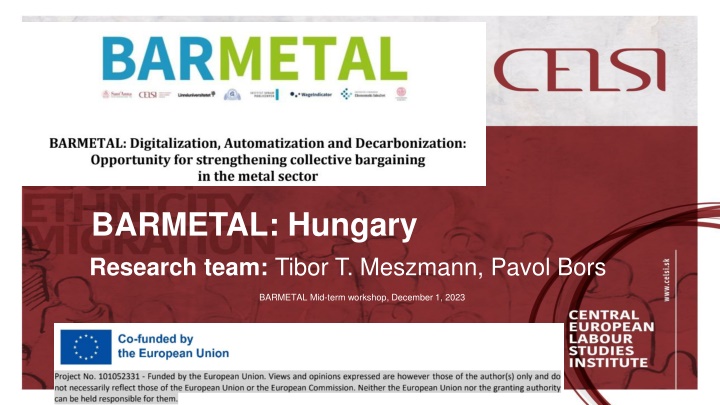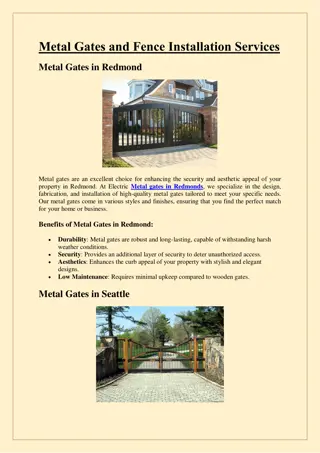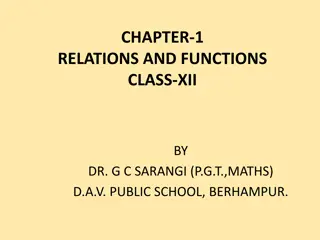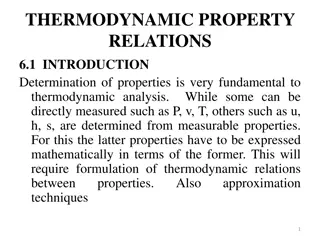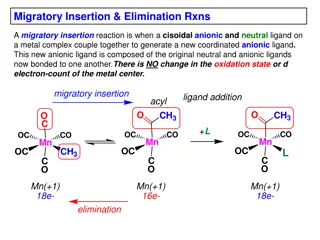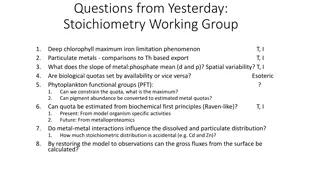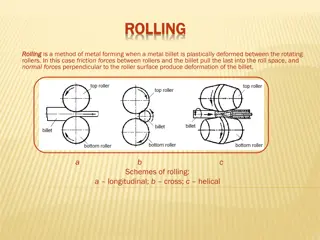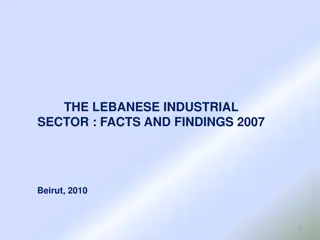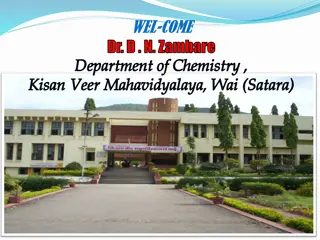Industrial Relations in Metal Sector: Challenges and Opportunities
The industrial relations in the metal sector in Hungary face challenges such as weak national-level social dialogue, decentralized collective bargaining, and outdated collective agreements. The sector exhibits high dependency on investments, limited technology adoption, and potential threats to low-skilled workers. Despite these challenges, opportunities exist in promoting digitalization, addressing skill formation, and enhancing productivity to meet the demands of the evolving economy.
Download Presentation

Please find below an Image/Link to download the presentation.
The content on the website is provided AS IS for your information and personal use only. It may not be sold, licensed, or shared on other websites without obtaining consent from the author.If you encounter any issues during the download, it is possible that the publisher has removed the file from their server.
You are allowed to download the files provided on this website for personal or commercial use, subject to the condition that they are used lawfully. All files are the property of their respective owners.
The content on the website is provided AS IS for your information and personal use only. It may not be sold, licensed, or shared on other websites without obtaining consent from the author.
E N D
Presentation Transcript
BARMETAL: Hungary Research team: Tibor T. Meszmann, Pavol Bors BARMETAL Mid-term workshop, December 1, 2023
Main features of industrial relations (in metal) National level social dialogue weak, in crisis (no c.b.!) in manufacturing sectors: CBA and social dialogue decentralised to the company level Weak employer organisations, union density rate 10%, competitive pluralism, coverage est. 20% the role of the state via measures/programmes (nontransparent) + centralised national legislation and regulation have a decisive impact - special decrees on decarbonisation but also packages to attract/keep investment (direct/indirect financialisation) => affecting both the content and security of social dialogue and CBA on the company level consultation/social dialogue regarding the introduction of new technologies: in the domain of works councils and not trade unions - social dialogue and not collective bargaining. works councils per se weak, only if trade union delegates present in WC Collective agreements: outdated system of collection, do not have clauses on DAD introduced/amended
General developments in production, DAD in metal and coll. bargaining High dependency on investments, a roller-coaster of manufacturing output (grew in 2022 compared to 2021, fell in 2023) except OEM comparatively little new tech investment at existing plants (new shop) Greenfield investments with newer technology/ green products - but no union presence Delay in overall tech (and productivity) development: in the long term, it could threaten the low-skilled. Not for the time being, because for the time being there is only so much digitalisation and automation, as far as this will replace labour shortages, lack of labour (ER)... besides bottlenecks in investment/productivity also in skill formation for the new economy (large MNC centric s.f.) Possible direction: huge company segmentation between top of chain companies, with high transformation (limited employment, high skill, high standards/productivity) and its (depressed) supplier ecosystem with low qualification requirements/high competition/high insecurity/flexibility DAD: no or few mentions at highest level social dialogue body no (at best a peripheral) issue in collective (wage) bargaining (agreements) Collective wage bargaining dominant form: informed/pressed by investments/ costs (CO2 quota)
Average employment of white and blue collars at carmakers and automotive suppliers by cohorts of white and blue collar workers in selected NACE 3 regions (year, number of employees), data for 2022 first 3 quarters. Data source: Hungarian Statistical Office, own presentation Blue collars at carmakers White collars at carmakers white collars at suppliers Blue collars at suppliers
Average employment of white and blue collars at carmakers and automotive suppliers by cohorts of white and blue collar workers in selected NACE 3 regions 2019-2022, Data source: Hungarian Statistical Office, own presentation
OEM level of DAD, changes in the past and planned Body shop (Press) Assembly shop Paint shop Starting level of digitalisation/automatisation - changes in last 10 years - planned changes (new product/production) Employed 4600/TU1-3: 1200-460-50, WC election fail intermezzo (2021-2023), established IR, communication
OEM: changes on work and employment and CBA overview of measures adopted in response to technological change, (Preparation for) Tech change uneven - more dynamic at the level of high-skilled (R+D, production design) Preparation for major change: Training at Leitwerke of selected crew, internal skill formation induced, functional flexiblity rewarded in assembly shop via working time arrangement (1 shift) to what extent are these topics being integrated in collective bargaining Topics emerge only indirectly shaping collective (wage) bargaining, associated with profit sharing (innovation share), employment security, career development, income levels, skill formation and (re)qualification obstacles to bargaining Limited, delayed information (also due to problems in works council elections) management change, collective bargaining limited to wage and certain period (issue did not emerge till 2023) Initiated changes to CBA - slow or no reaction from management plans for expanding bargaining with these topics, ongoing information sharing and social dialogue involving all employees (company communique November, December 4: extended union meeting ) alternative mechanisms of implementing the identified policies if bargaining is not a viable option, etc. NA
Case 2(s) automotive subcontractors and basic metals Overall regional representative and interviews with unions/workers at 5 (4) companies Most significant changes in recent years in DA: logistics - work processes and jobs in Dc: basic metals Insecurities dominate: Ownership change/financialisation OR dependency on headquarters (limited investment or transfer of production technology) OR Dependency on contractors (loss of tender - huge competition in logistics) Issues (for individual/collective bargaining): solving internal training / requalification (part of working time?), skill formation, turnover Most acute financialisation pressure due to decarbonisation: basic metal - iron (Case 2) Bankruptcy - privatisation measures - recent special legislation Plans to start production based on new green technology Problems of skills: in the years of insecurities the most skilled highest tendency to leave
